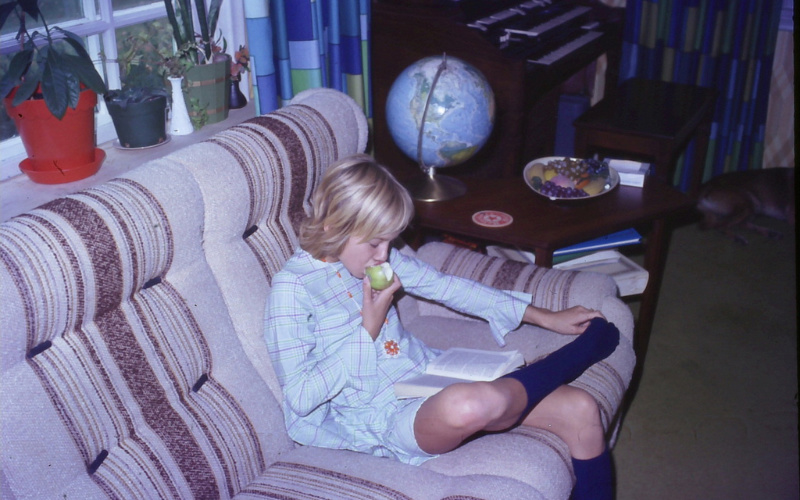Voicing Pleasure
Christina Brandon
Listen to Voicing Pleasure:
When I was about 13, I stole my mom’s romance novels and secretly read them in the bathtub. The covers were beautifully jewel-toned but innocuous. They didn’t feature people. The stories were part of Julie Garwood’s historical series. They took place in sexy locales like medieval England and the highlands of Scotland. The hero was some brooding warrior type who was somehow compelled to protect and/or marry a beautiful and strong-willed young woman. They learned to love each other while having hot, but conventional (i.e. heterosexual, monogamous) sex.
My mom had several of these novels stashed high on a shelf in the linen closet and I read them all.
I bought my own romance novel once, when I was a teen. Mom and I were shopping at a store that was like an upscale version of Dollar General, and I found a book called The Buccaneer. This one had a fantastic cover: a man with long black hair stands alone in the rain. He’s not wearing a shirt. His big, strong arms and chiseled pectorals glisten. The moon glows behind him.
I bought the book when my mother wasn’t looking.
From what I remember, the plot was generally similar to the Julie Garwood books except set on a boat. A strong man and a young, virginal woman are thrown together for some reason and ultimately end up having hot sex and falling in love.
I was fascinated by their tête-à-têtes, by the audaciousness of this young woman (A virgin! Like me!) laying on this big pirate’s bed naked, protected only by a string of pearls. That this book was reinforcing antiquated notions of female sexuality, that the young heroine was outsmarting this big pirate by spinning tales of her sexual exploits so he’d think her a whore and, therefore, not ruin her by taking her virginity, didn’t register in my middle school brain. I wanted to read about falling in love, to feel the tension of defenses cracking apart as two people took tentative steps toward each other.
And then when they finally touched! Heat spread through my middle. My breath deepened. My eyes were huge with awe and hunger. I could think only “WHOA.” I re-read these scenes again and again.
I read any romance novel I could get my hands on while taking baths, when I knew I would be undisturbed for long stretches of time. I stayed in the tub, enjoying the sensation of the water around me as I shifted, as warm droplets rolled down my body. I stayed, toes pruning until they felt like warped paper instead of part of me. I stayed until the water cooled too much to enjoy.
I don’t remember the first time I masturbated. I do remember shimmying around like Madonna alone in my bedroom, laying naked on my bed and feeling good about it. But not the touching. I certainly didn’t talk to anyone about it, not even when my mother sat me down to have “The Talk” when I was in middle school. She created helpful, visual aids though. A skilled artist, she drew a penis and labelled it: scrotum, shaft, foreskin. We talked about periods and tampons and stuff too. But we did not talk about self-pleasure, or pleasure in general.
Sex, except for “The Talk,” was a topic avoided at my house. If anything beyond the chastest of kisses appeared in a TV show or movie with my father around, my parents changed the channel. This mirrored their affectionate, but not passionate marriage. I had only one indication that they were sexual people, besides the obvious fact of my existence: a Frederick’s of Hollywood catalog. I discovered it under the sink in my parent’s bathroom around the time I was stealing time to take baths and read about caresses, kisses, and aroused feelings. The catalog, full of women in black and red fishnets and sexy lingerie, gave me that same feeling and made my breath deepen.
One of my mother’s favorite movies in the ‘90s was Pretty Woman, staring Richard Gere as Edward the wealthy, sexy, reticent businessman and Julia Roberts as Vivianne, a carefree sex worker with a heart of gold. Mom, a much more expressive person than my father, let 10-year-old me watch nearly all the movie except the part with the piano. She fast forwarded through that whole scene so it was years before I understood what was going on.
Here it is: Richard Gere—Edward—has left the hotel penthouse angry and is trying to work out his feelings alone, by passionately playing the piano in the hotel bar, which is otherwise closed for the night. Julia Roberts—Vivianne—walks in, full of concern and wearing an over-sized hotel robe over black silky lingerie. He opens her robe. He lifts her and leans her back so she’s laying on top of the piano. His hand travels over her chest, her waist, her hips. The camera zooms out and the shot fades with his head moving between her legs.
This kind of scene was all over my mother’s romance novels: the sexy, internally passionate, outwardly stoic man decides when and how to give a woman pleasure. The plot of these stories was often propelled by his sexual appetite, not hers, not theirs.
I’m not disputing the hotness of what happened on the piano. Or in these romance novels, where women freely consented and enjoyed themselves. I am saying that, in these heterosexual relationships, the onus is so often put on men: to silently make a move, to decide. The stories I knew elevated the smoldering gaze to an art form, but forgot that people also had voices capable of articulating desire, and that many of those voices belong to women. How can a young woman learn to feel confident and articulate her own needs when such things are ignored, or presumed? Or left up to someone else?
Despite stealing my mom’s romance novels and watching them in movie form, I didn’t know how to say what I was feeling, to say these words I was reading out loud. I didn’t need to in the bathtub. I was cocooned there, safe. But to say these things to another person? To tell them, “I like” or “I want?” I struggled to allow my own defenses to crack. It can feel less painful to let someone else choose, to wait for something to be over, than to say what I want.
The first time I felt a man’s finger in my underwear I hated it. It was pokey and boney. I didn’t ask for it, but I let him. I thought I was supposed to like it. The women I read about in books did. He was my boyfriend at the time, he was trying to make me feel good. I was clueless then, unsure what was fantasy and inspired by stories I had read and what I wanted. But after several seconds, a minute or two, I knew I didn’t like what was happening. I didn’t know how to find my voice. So I sat there and let him move his finger around. He eventually got bored, too.
In retrospect, that Pretty Woman piano scene was a missed opportunity for a needed, teachable moment.
Jennifer Weiner prompted these memories in an Op-Ed she wrote in the New York Times about how romance novels were her sex ed growing up. Though I wholly agree that novels provide a more complex and nuanced view of what happens before, during, and after sex, than parents or school, or even porn, and though reading helped me understand my own sexuality, that didn’t translate into me talking about it. Terrible books like The Buccaneer may have done more to reinforce patriarchal notions of women being either virgins or whores than providing a roadmap for how to talk about sex in a positive way.
Even now, as a full grown woman who’s read way beyond Julie Garwood and more worthwhile stories than The Buccaneer, I still falter in finding my words. To communicate want and desire is to make yourself vulnerable. And I hate feeling that way. I want to be strong, like these hot virile heroes, who are always so capable and knowing, but still me, in my body. I’m not sure how to be all of the above, to be vulnerable but not afraid.
I admit I have to fight myself in this, my introverted nature. I keep my feelings close to my heart. I’m prone to moody silences. But I don’t think I deserve all the blame. We lack a culture that encourages us to feel vulnerable. To explore, to learn. We lack a culture that makes us feel safe. We have one that wants us to twist ourselves into shameful knots to prevent us from doing one of the most basic things a human does: wanting.
The most obvious explanation for this is that the public world revolves around cis-gendered men: their power, their voices, their erections. The romance book industry is proof of the simple idea that women are feeling, sexual beings too. But it’s often the butt of jokes. Women who express desire, interest and curiosity in pleasure, or appear sexy in anyway can open themselves up to ridicule and make people squeamish. Worse, we become an excuse for the terrible things men do to us. Because we were asking for it. Or for all those other bullshit reasons out there.
The election of Donald Trump was the moment when I realized that too many people wanted control—wanted someone to control—other people’s bodies. Then the #MeToo movement where women and men have fought back against this control but brought with it the despair that even trusted men have been no better. It’s starting to feel like everyone is guilty.
And no wonder. Our culture has been weaving this desire to control others into so much for so long. See it in the lunacy of abstinence-only education that won’t acknowledge a basic truth that people will have sex and need guidance on how to do it safely, abortion laws that punish instead of help, a film rating system that is softer on violence than consensual sex, stories that automatically doubt a woman’s word when she says she was raped, stories that make women objects of desire and things to be taken.
We learned to keep quiet. To shut doors and sneak away into bathrooms. Way too often it feels safer to not be seen. To not be heard.
But pleasure should not be a “keep it secret, keep it safe” thing. The body was built to feel good. Think of the sensitive skin on the back of the wrist, on the neck, behind the ear, the crook of the elbow. There are 4,000 sensory nerve endings in the penis, over 8,000 in the tip of the clitoris alone. And only one quarter of the clitoris is outside the body. Beneath the surface of the skin, wrapping around, down, and extending toward the thighs are muscle and tissue, and 15,000 nerve endings. 15,000. Consider that. It’s a hell of a lot to work with.
Being open about— and finding the words to talk about— pleasure is better than keeping silent. We all need the freedom to figure out what we like, to explore and learn and share. We need to create our own safe spaces and not wait for others to do it for us. It’s time to unravel those knots. As Jennifer Weiner advised, find a good book. Coming to understand what we like won’t shield us from potential embarrassment and awkwardness, certainly not from feeling vulnerable. But it’s the only way to feel good. So say it out loud. Ask for it. Imagine all the possible sensations wrapped in all those nerve endings, waiting.
Provenance: Submission
 Christina Brandon taught English in China for two years before she returned to the United States. She now juggles a job in user experience with writing essays. Her work has appeared in “The Billfold,” “Story Club Magazine,” “Compose,” and others. She writes a monthly TinyLetter, “Humdrum,” performs at storytelling shows and coproduces a monthly show called Duly Noted in Chicago. “Failing Better,” her memoir about living in China, was published in October 2018.
Christina Brandon taught English in China for two years before she returned to the United States. She now juggles a job in user experience with writing essays. Her work has appeared in “The Billfold,” “Story Club Magazine,” “Compose,” and others. She writes a monthly TinyLetter, “Humdrum,” performs at storytelling shows and coproduces a monthly show called Duly Noted in Chicago. “Failing Better,” her memoir about living in China, was published in October 2018.
Featured Image: “1974family02” by Yolanda is licensed under CC BY 2.0


No Comments